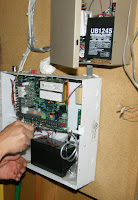 Home smoke alarms, also called single- and multiple-station smoke alarms, should be, by National Fire Code (NFC), replaced every 10 years.
Home smoke alarms, also called single- and multiple-station smoke alarms, should be, by National Fire Code (NFC), replaced every 10 years.
“According to NFPA, aging smoke alarms don't operate as efficiently and often are the source for nuisance alarms. Older smoke alarms are estimated to have a 30% probability of failure within the first 10 years. Newer smoke alarms do better, but should be replaced after 10 years. Unless you know that the smoke alarms are new, replacing them when moving into a new residence is also recommended by NFPA” (NFPA urges replacing home smoke alarms after 10, National Fire Prevention Association, Quincy, Mass.)
The important point to know is which type of sensor fits the definitions set forth in NFPA 72, NFC, assembled by the consensus of fire professionals and experts and published by NFPA. For example, a single-station smoke alarm, whether used in stand-alone or multi-mode format, is that of the common, ordinary battery-operated detector found in most homes. This includes the 120VAC detector that often comes with a 9-V backup battery. In many locales, for good or bad, the latter has become the detector of choice among code enforcement officials, although recent changes in the NFC allows the use of smoke detectors (read on)’ Photo Caption: This is a combination fire/burglar alarm panel with a supervised power supply in the top panel.In contrast, the other type of smoke detection device that fire technicians commonly work with is the smoke detector, which connects to a fire alarm system in the home or business. This type of detector derives its operating power from an approved and listed power supply, usually part of a compliant fire alarm control panel. Thus, a smoke detector is able to report alarms and possible trouble conditions to a central monitoring station, as well as locally in the home by sounders placed throughout.
The reason why smoke alarms must be replaced every 10 years primarily relates to the fact that residential smoke alarms are rarely inspected and cared for in the same manner as smoke detectors. In addition, there are safeguards built into a fire alarm system that are designed to detect sensitivity and operational issues that smoke alarms cannot perform in a proactive manner.
If you should have questions pertaining to the smoke alarms in your home and you need the advice of a professional, ESC stands ready to assist you in any and every way possible. If you have a fire alarm system and you’re having issues, also feel free to call on ESC. We offer the finest in service and installation in the state of Ohio.
Give us an opportunity to prove ourselves to you by calling me today. Use our quick response form on the right or visit our Contact Page.
John Larkin, Senior Partner



No comments:
Post a Comment